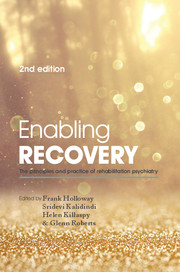Book contents
- Frontmatter
- Contents
- List of contributors
- List of figures, tables and boxes
- Preface
- Part 1 Setting the scene
- 1 Rehabilitation in a historical context
- 2 What is psychiatric rehabilitation?
- 3 Rehabilitation as a values-led practice: the contribution of recovery, social inclusion and personalisation
- 4 A comprehensive approach to assessment in rehabilitation settings
- 5 Understanding madness: a psychosocial perspective
- 6 First-person narratives
- Part 2 Treatment approaches
- Part 3 Key elements of a rehabilitation service
- Part 4 Special topics in psychiatric rehabilitation
- Part 5 Future directions
- Index
1 - Rehabilitation in a historical context
from Part 1 - Setting the scene
Published online by Cambridge University Press: 02 January 2018
- Frontmatter
- Contents
- List of contributors
- List of figures, tables and boxes
- Preface
- Part 1 Setting the scene
- 1 Rehabilitation in a historical context
- 2 What is psychiatric rehabilitation?
- 3 Rehabilitation as a values-led practice: the contribution of recovery, social inclusion and personalisation
- 4 A comprehensive approach to assessment in rehabilitation settings
- 5 Understanding madness: a psychosocial perspective
- 6 First-person narratives
- Part 2 Treatment approaches
- Part 3 Key elements of a rehabilitation service
- Part 4 Special topics in psychiatric rehabilitation
- Part 5 Future directions
- Index
Summary
Those who cannot remember the past are condemned to repeat it.
George SantayanaIntroduction
‘Rehabilitation psychiatry’ is a relatively new term. It combines a word that is quite old – rehabilitation (which initially related to restoring one's title or place in society, and which gained its current meaning only in the early 20th century) – with a word – psychiatry – first coined in the early 19th century (from the Greek ‘healing the mind’). Specific rehabilitation departments were developed in UK mental hospitals only in the 1950s, since when rehabilitation services have flourished, declined and then re-emerged as a core element of mental healthcare, albeit often rebranded under various fashionable rubrics.
This chapter looks at the ‘pre-history’ of psychiatric rehabilitation and its development since the 1950s, when it was first identified as a specialty. The story is inevitably highly selective, given the range of material available. Some important themes, for example the voice of the patient (or service user, or survivor), which was first influential during the 19th century, and the Recovery Movement and its precursors, are discussed in detail elsewhere in this book (see Chapters 6 and 3, respectively). The present chapter draws largely but not exclusively on the evolution of ideas and practice in England: very similar though subtly different stories could be told for France, Germany and the USA (Stone, 1998).
The difficulties of any historical analysis of psychiatry were well described by Berrios & Freeman (1991) in their introduction to 150 Years of British Psychiatry. One problem is ‘presentism’ – seeing the past from a perspective that takes no account of the intellectual, social and cultural context of the times. A further potential pitfall is developing a story of uninterrupted progress (in historical jargon, the Whiggish interpretation of history): in reality, progress in what we would now call psychiatric rehabilitation has ebbed and flowed. Another problem with any attempt at understanding the past, not mentioned by Berrios & Freeman, is that historical sources overwhelmingly represent the experiences of a privileged and literate elite.
- Type
- Chapter
- Information
- Enabling Recovery , pp. 3 - 17Publisher: Royal College of PsychiatristsPrint publication year: 2015



